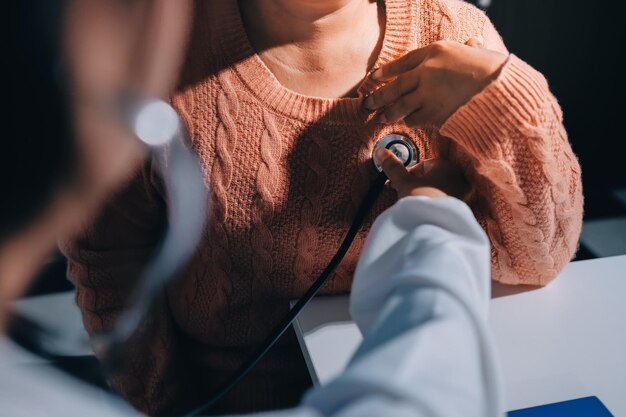Your Guide to Can Cancer Cause Hypertension
What You Get:
Free Guide
Free, helpful information about HyperTension FAQ and related Can Cancer Cause Hypertension topics.
Helpful Information
Get clear and easy-to-understand details about Can Cancer Cause Hypertension topics and resources.
Personalized Offers
Answer a few optional questions to receive offers or information related to HyperTension FAQ. The survey is optional and not required to access your free guide.
Understanding the Link Between Cancer and Hypertension
When we think about cancer, hypertension might not be the first thing that comes to mind. However, the connection between these two medical conditions is more significant than many may realize. Can cancer cause hypertension? The answer is a multifaceted yes, involving direct and indirect pathways.
How Cancer May Lead to Hypertension
Physiological Effects of Tumors and Treatment
Certain types of cancer, particularly those affecting the adrenal glands such as pheochromocytoma, can directly influence blood pressure by increasing the production of hormones like adrenaline, which naturally elevate heart rate and blood pressure. Moreover, cancer treatment itself can contribute to hypertension. Common cancer treatments like chemotherapy and targeted drugs might result in increased blood pressure as a side effect, impacting the cardiovascular system's natural balance.
Stress and Lifestyle Changes
It's equally important to consider the emotional and lifestyle factors linked to a cancer diagnosis. The physiological stress of dealing with cancer can lead to an increase in blood pressure. Changes in lifestyle, such as decreased physical activity and weight gain due to treatment side effects, further elevate hypertension risk.
Managing Hypertension in Cancer Patients
Importance of Monitoring
For those battling cancer, regular monitoring of blood pressure is crucial. Managing hypertension can prevent additional complications, such as heart disease, which might exacerbate already challenging medical treatments. Healthcare professionals often recommend integrating blood pressure management as a routine part of cancer care.
Treatment Options
Addressing this dual challenge might involve both pharmaceutical and lifestyle interventions. Medications such as beta-blockers or ACE inhibitors could be prescribed. Simultaneously, lifestyle modifications, including a balanced diet, maintaining a healthy weight, and managing stress, are key strategies in supporting cardiovascular health during cancer treatment.
The Intersection of Health and Finance
Navigating Treatment Costs
The financial burden of managing both cancer and hypertension can be overwhelming. But rest assured, there are resources available to alleviate this stress. Government aid programs and specialized grants can significantly offset the cost of treatment and medication.
Financial Assistance and More
- Government Aid Programs: Initiatives like Medicaid and Medicare offer invaluable support for eligible patients, covering many treatment expenses.
- Charitable Organizations: Numerous non-profits focus on assisting cancer patients, helping with everything from treatment costs to daily expenses.
- Debt Relief Options: If medical bills pile up, exploring debt management solutions and payment plans with healthcare providers can help manage financial burdens.
- Educational Grants: Scholarships and grants for those pursuing education while undergoing treatment provide pathways to future financial stability.
Empowering Patients Through Resources
Navigating the dual challenges of cancer and hypertension requires not just medical intervention but also financial and emotional support. While healthcare teams focus on providing thorough medical care, leveraging available financial resources is crucial to easing the journey for patients and their families.
Financial Resources: Navigate with Confidence
- 🏥 Medicare/Medicaid: Government programs covering medical expenses.
- 💰 Patient Assistance Programs: Discounts on medication costs by pharmaceutical companies.
- 📚 Educational Scholarships: Financial aid for students affected by cancer.
- 💳 Debt Management Plans: Customized plans for clearing outstanding medical bills.
- ❤️ Support Networks: Local and national cancer support groups offering guidance.
Empowerment through integrated care and financial management fosters a comprehensive approach to health, offering a brighter, more manageable path forward.
What You Get:
Free HyperTension FAQ Guide
Free, helpful information about Can Cancer Cause Hypertension and related resources.

Helpful Information
Get clear, easy-to-understand details about Can Cancer Cause Hypertension topics.

Optional Personalized Offers
Answer a few optional questions to see offers or information related to HyperTension FAQ. Participation is not required to get your free guide.


Discover More
- a 66 Year Old Female With a History Of Hypertension
- Are Eggs Bad For Hypertension
- Are Eggs Good For Hypertension
- Are Endocrine Disorders Causing Hypertension Rare
- Can Adderall Cause Hypertension
- Can Alcohol Cause Hypertension
- Can Allergies Cause Hypertension
- Can Anemci People Get Hypertension
- Can Anemia Cause Hypertension
- Can Antibiotics Cause Hypertension
